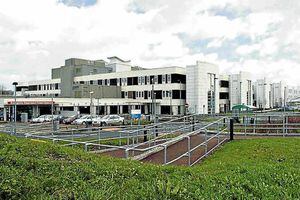Thousands of hospital operations in West Midlands cancelled on the day patients go in
Thousands of operations at hospitals across the West Midlands are being cancelled on the day they are due to take place, it has been revealed.

Almost 3,500 procedures were cancelled on the same day at five hospitals in the region in the last year, figures obtained by the Express & Star have shown.
And only a fraction of those operations are carried out within the next week, leaving patients in limbo as they prepare to go under the knife.
Across the five NHS Trusts in Dudley, Wolverhampton, Walsall, Sandwell and Staffordshire, 3,489 operations were cancelled on the day they were due to take place in 2013. This compares to 3,129 in 2012 and 2,774 in 2011.
Almost half of those cancelled - 1,657 - were in Dudley, with just 147 of those taking place in the next seven days.
There were 671 cancelled in Wolverhampton, 646 in Sandwell, 312 at Mid-Staffs and 203 in Walsall.
The most common reasons for the cancellations are a lack of beds, an increase in more urgent emergency cases, and there not being enough time to complete all of the planned operations that day.
Paula Clark, chief executive at Dudley Group NHS Foundation Trust, which runs Russells Hall Hospital, said: "The Dudley Group always makes every effort to carry out operations on the day they are planned; however, there are some occasions when this is not possible and surgery has to be postponed.
"Postponing operations is never ideal and we always apologise to our patients for any distress or inconvenience this may cause.
"We do appreciate the lengths people go to when they make arrangements when they come into hospital and we don't take these decisions lightly.
"This small increase in cancellations is due to an increase in emergency admissions prompting a greater demand on beds."
Maxine Bygrave, chair of Wolverhampton Healthwatch, said hospitals should plan better to help bring down the number of cancelled operations.
She said: "It is extremely stressful for people to have to go through an anxious wait for an operation.
"But it often has an impact on the family or carers of the people who are involved as well, who will change their lifestyle to help look after the person.
"It can cause quite a bit of chaos for everybody involved.
"We understand that sometimes hospitals are under a lot of pressure, but with more thorough planning some of this could be avoided.
"It's about having the right levels of staffing so if an emergency does come in, there isn't a need to cancel the planned operations."
Chris Holt, chief operating officer at Mid Staffordshire NHS Foundation Trust said: "We recognise the inconvenience and distress caused to patients who have their operations cancelled on the day they were due to take place, and we try very hard to avoid this. Unfortunately, cases of unavoidable cancellation do still sometimes occur.
"This is due to circumstances often beyond our control, such as staff sickness, emergency pressures on theatre time, or patients not attending. In all cases, we try to offer new appointments as soon as possible."
Suzanne Jarvis, care group manager for theatres at Walsall Healthcare NHS Trust said they have been working hard to improve their figures.
She said: "Using data we have analysed our key reasons for cancellations and implemented new systems to try and prevent these as much as possible.
"New initiatives include ensuring all patients attend pre-assessment before surgery so they are fit and well prepared for the day of their surgery and a weekly meeting whereby we review the theatre lists for next week to ensure patients are listed correctly, there is sufficient time and equipment and enough Critical Care beds."
Rachel Barlow, chief operating officer at Sandwell and West Birmingham Hospitals NHS Trust, said the figures for this year have already improved following efforts to reduce the number of cancellations.
She said: "We all want to reduce the misery of cancellation for our patients. The latest figures show improvements since January 2014 when 84 operations were cancelled. The number of cancelled operations has fallen each month since January. Our most recent figure for May shows that we had 43 operations cancelled. We apologise to each of those patients.
"The improvements driving this change include work we have done on the urgent assessment of emergency patients, so that there is less pressure on our beds as a whole.
"We have also looked at improving the efficiency of our theatres, which involved reviewing all theatre lists to ensure the correct number of patients are scheduled. This work continues."





